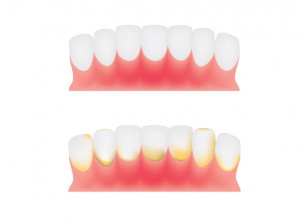Our gums don’t receive nearly the same level of attention as our teeth. This is mainly be due to the inferior role they play in a smile (although gums are a key aesthetic component of a grin, and patients even seek cosmetic surgery to create the right gum-tooth balance). While your gums may not be quite as obvious, they deserve the same level of careful attention you pay to your teeth. Oral health isn’t just about cavity-free teeth: it encompasses the state of both teeth and gums.
Why Should I Care About Healthy Gums?
In order to change your way of looking at periodontal health, consider one key difference between your teeth and gums. The living tissue that composes your teeth has its own defenses. Hard enamel covers the more sensitive areas, protecting the tooth’s nerves and dentin. Gums don’t have the same tool. The soft tissue is prone to irritation and infection – and the delicate relationship between your teeth and gums hangs in the balance. Proper brushing and flossing, scheduling regular dental exams, and taking note of what your gums are telling you will help you take action before your gums begin to suffer – and show serious consequences like those listed below.
Diseased gums can’t support healthy teeth.

Healthy gums keep healthy, beautiful teeth in place. The opposite is therefore true as well – unhealthy gums fail to preserve your smile. Gum disease begins to take hold when plaque attaches to your gum line. This plaque reaches between your teeth and gums, separating the two entities. As your gums pull away from your teeth, the teeth become loose. Even worse, plaque development is accelerated by the presence of bacteria-filled periodontal pockets. As you can imagine, the tooth’s stability is inherently compromised.
When you have a serious case of gum disease, entire tooth loss is always a possibility. If the infection is too serious, it will make the tooth less stable and threaten its future. The presence of plaque at the gum line can also lead to decay developing in neighboring teeth. If this decay reaches the interior of the tooth, extraction or root canal will be necessary.
No matter the route it takes, periodontal disease has a very real chance of claiming your teeth.
Your gums are essential to your whole body health.
Periodontal health is linked to a variety of systemic diseases. Though research is ongoing and a clear connection has not yet been established, periodontal problems seem to increase the chance of heart disease. Did you ever think puffy gums could lead to something so serious? All the more motivation to pick up the floss tonight.
Patients with diabetes are also more likely to develop periodontal disease. Keeping your tissues free of infection is vital whether you have diabetes or not, but is especially harmful for the diabetic. Inflamed gums will lead to further problems with blood sugar regulation and ailing health.
Your gums can show signs of health problems stemming from other areas of the body, before they’re noticeable on a larger scale. Visit Dr. Hargreaves every six months to give periodontal prevention a fighting chance.
Gum Disease is Insidious
Periodontal disease isn’t always obvious – infection can intensify without causing you noticeable pain or showing visual tells at the gum line. This is part of the reason that gum health mandates regular dental exams. Prevention is the simplest way to avoid the messy complications that can accompany periodontal problems. You can avoid restorative surgery, uncomfortable treatment, and years of close periodontal monitoring.
Make disease prevention simple: pick up the phone and schedule your next dental exam today.

